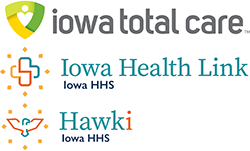Language Services
Iowa Total Care provides free aids and services to help our members communicate effectively. These tools are for members:
- Whose primary language is not English.
- Who are deaf or hard of hearing.
- Who are blind or have low vision.
- Who have a speech disability.
- Who have culturally and ethnically diverse backgrounds.

- Qualified interpreters are available for members whose primary language is not English.
- If a member is deaf or hard of hearing, American Sign Language interpreters are also available.
- Interpreters are available for all services that are billable to Medicaid. These include; medical, counseling, dental, bh and subtance abuse.
- They can help at medical visits or with complaints.
- Interpreters can assist via video, over the phone or in person.
- These services are free of charge to you and the member.
Does a member need an interpreter for their medical visit? Let us know. There are two ways:
- Complete our Language Services request form. Return by email at least seven (7) days before the member's appointment. This will allow us time to find the right person for them.
- Call Member Services: 1-833-404-1061 (TTY: 711). Hours: Monday through Friday, 7:30 a.m. to 6 p.m. CT.
- Note: Providers need to provide their NPI or TIN when scheduling interpretation services.
Questions? Need more information? Contact C&L@IowaTotalCare.com.
Additional details and guidance are available in the Resources & Toolkits section below.
NOTICE: Please Avoid Using Minors, Family Members, or Friends as Interpreters
Federal law prohibits providers and staff from recommending or requiring the use of family or friends to interpret, or requesting them to provide their own interpreter. Interpretation services must be available at the time of the appointment. Minors should never be used as interpreters except in the case of an emergency involving imminent danger or threat to the safety and welfare of an individual or the public where there is no qualified interpreter available. If you use a minor, document the reason a minor was used.
Similarly, an adult may be used to interpret or aid in communication in an emergency involving imminent danger and there is no qualified interpreter available or; when the limited English proficient (LEP) individual specifically requests that an accompanying adult interpret, the adult agrees and reliance on that adult is appropriate.
Bilingual providers and staff are considered qualified to provide language services if they have a demonstrated proficiency in speaking and understanding both English and at least one other language, including any necessary specialized vocabulary, terminology, and phraseology; are able to effectively, accurately, and impartially communicate directly with individuals with limited English proficiency in their primary language. Iowa Total Care verifies language capability of health plan staff through bilingual assessments in target languages and through the hiring, training and evaluation process for staff in English. Members should always be advised of the risks of using an untrained interpreter could result in miscommunication of medical information and compromise quality of care. It may also cause embarrassment when discussing sensitive topics.
If a member declines interpretation services, it is best practice that providers document such in the medical record at the time of service. It is also recommended that an interpreter be offered for every encounter regardless of whether the member has refused the service in the past and that each offer be documented in the members chart.
Does a member need written material in a language other than English? Please call Member Services: 1-833-404-1061 (TTY: 711). We can also provide other formats such as Braille, audio or large print.
Want more information? Visit the Resources & Toolkits section below.
Community Organizations
- Iowa Bureau of Refugee Services (Iowa Department of Health & Human Services)
- Refugee Alliance of Central Iowa
Resources
- Americans with Disabilities Act (ADA) & Service Animals Quick Reference Guide (PDF)
- Health Literacy Quick Reference Guide (PDF)
- Interpretation Services Poster (PDF)
- Language Services Quick Reference Guide (PDF)
- Language Services Information & Resources for Members
Toolkits
- Georgetown University National Center for Cultural Competence
- Health Literacy: Help Your Patients Understand Their Health & Health Care (PDF)
- Industry Collaboration Effort: Better Communication, Better Care: Provider Tools to Care for Diverse Populations (PDF)
- Project ImpliciT
- Psychiatric Rehabilitation Association: Principles of Multicultural Psychiatric Rehabilitation Services
- Substance Abuse and Mental Health Services Administration (SAMHSA): Increasing Cultural Competence to Reduce Behavioral Health Disparities
- U.S. Department of Health & Human Services | Office of Minority Health: Resources to Implement Cross-Cultural Clinical Practice Guidelines for Medicaid Practitioners
- U.S. Department of Health & Human Services: A Physician’s Practical Guide to Culturally Competent Care
- U.S. Department of Health & Human Services: National Standards for Culturally and Linguistically Appropriate Services (CLAS) in Health and Health Care
- U.S. Department of Justice | Community Relations Service: Understanding Bias: A Resource Guide
Contact information:
- Phone: 1-833-404-1061 (TTY: 711)
- Fax: 1-833-809-3868
- AppealsGrievances@IowaTotalCare.com
- Mailing address:
Iowa Total Care
Attn: Appeals
1080 Jordan Creek Parkway, Suite 100 South
West Des Moines, IA 50266

